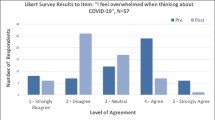Abstract
This brief chapter is about a statewide project to create educational materials that now have two complementary goals: to help teachers deliver classes that meet new Michigan social studies standards, and to help students learn about COVID-19. The first part of the project was underway before the pandemic began, but (like most educational-development activity) it was complicated by COVID-related lockdown rules, remote-learning efforts, and budget problems. This chapter has examples and brief descriptions of five separate but related efforts: a preliminary “stop-gap” lesson about COVID-19, a program to review online materials about the disease, some COVID-19 insertions into curriculum units that are currently being developed and tested, a lesson that uses an existing graphic organizer to put COVID-19 into context with other historic pandemics, and a framework for a COVID-knowledge discussion platform.
Access this chapter
Tax calculation will be finalised at checkout
Purchases are for personal use only
Similar content being viewed by others
References
Anderson, J. R., Pyke, A. A., & Fincham, J. M. (2016). Hidden stages of cognition revealed in patterns of brain activation. Psychological Science, 27(9), 1215–1226.
Anthony, D. A. (2007). The horse, the wheel, and language: How bronze-age riders from the Eurasian steppes shaped the modern world. Princeton University Press.
Downs, R. M. (1994). The need for research in geography education: It would be nice to have some data. Journal of Geography, 93(1), 57–60.
Frankopan, P. (2015). The silk roads: A new history of the world. Vintage Books, a division of Penguin Random House LLC.
Gersmehl, P., Gersmehl, C., & Mater, M. (2020). The GeoHistoGram: The neuroscience behind the design. The Geography Teacher, 17(1), 10–12.
Ghosh, V. E., & Gilboa, A. (2014). What is a memory schema? A historical perspective on current neuroscience literature. Neuropsychologia, 53(1), 104–114.
Goujon, A., Didierjean, A., & Thorpe, S. (2015). Investigating implicit statistical learning mechanisms through contextual cueing. Trends in Cognitive Sciences, 19(9), 524–533.
Huttenlocher, J., Newcombe, N., & Vasilyeva, M. (1999). Spatial scaling in young children. Psychological Science, 10(5), 393–398.
Mater, M., & Bloom, C. (2020). The world GeoHistoGram: A flexible organizer of both history and geography. The Geography Teacher, 17(1), 5–9.
Scott, J. C. (2017). Against the grain: A deep history of the earliest states. Yale University Press.
Sturz, B. R., Gaskin, K. A., & Robert, J. E. (2014). Incidental encoding of enclosure geometry. Memory and Cognition, 42(6), 935–942.
Turk-Browne, N. B., Scholl, B. J., Chun, M. M., & Johnson, M. K. (2008). Neural evidence of statistical learning: Efficient detection of visual regularities without awareness. Journal of Cognitive Neuroscience, 21(10), 1934–1945.
van Buuren, M., Kroes, M. C. W., Wagner, I. C., Genzel, L., Morris, R. G. M., & Fernandez, G. (2014). Initial investigation of the effects of an experimentally learned schema on spatial associative memory in humans. Journal of Neuroscience, 34(50), 16612–16620.
Author information
Authors and Affiliations
Editor information
Editors and Affiliations
Rights and permissions
Copyright information
© 2022 The Author(s), under exclusive license to Springer Nature Switzerland AG
About this chapter
Cite this chapter
Gersmehl, P.J., Gersmehl, C.A. (2022). Education as “Mental Vaccine:” Designing Educational Materials About COVID-19. In: Brunn, S.D., Gilbreath, D. (eds) COVID-19 and a World of Ad Hoc Geographies. Springer, Cham. https://doi.org/10.1007/978-3-030-94350-9_110
Download citation
DOI: https://doi.org/10.1007/978-3-030-94350-9_110
Published:
Publisher Name: Springer, Cham
Print ISBN: 978-3-030-94349-3
Online ISBN: 978-3-030-94350-9
eBook Packages: Social SciencesSocial Sciences (R0)



